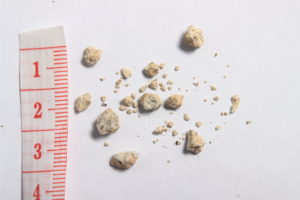Small kidney stones usually pass on their own.
Small kidney stones are defined as being less than 5mm in size. These stones are normally able to pass through the urinary tract on their own. Depending on the circumstances, it is generally safe to wait as long as four to six weeks for a small kidney stone to pass out of the body. However, if an infection develops, or urine flow becomes blocked, intervention will be required.
Small kidney stones
Individuals can follow some basic guidelines while waiting on a small stone to pass safely on its own. If bothersome or painful symptoms occur, medical help should be sought. If pain is excruciating, or the patient experiences fever, chills or sees blood in their urine, they should seek emergency help.
Drink plenty of water
To help flush the kidney stone from the body, it is recommended that individuals drink plenty of water. A general recommendation is to drink 2 to 3 quarts of water each day – enough water to produce clear urine. Fluids help to move the kidney stone through the urinary tract.
Over-the-counter medications for mild pain
A small kidney stone may cause only mild to moderate pain that can be controlled with over-the-counter medications like acetaminophen (Tylenol), ibuprofen (Motrin, Advil) and naproxen sodium (Aleve). Individuals should follow recommended dosages.
Prescription medication for severe pain
If the stone is causing severe pain, the urologist may choose to prescribe a narcotic. Providers may also inject patients with Ketorolac (Toradol), a more powerful anti-inflammatory medication. If the patient becomes severely dehydrated due to vomiting or the inability to drink enough liquids, the urologist may decide to give IV fluids and pain medications.
Medication to help stones pass
If the kidney stone still doesn’t pass on its own, the physician has the option to prescribe certain medications that are known to help kidney stones pass. A common medications is Tamsulosin (Flomax), which works by relaxing the ureter, the small tube that carries urine from the kidney to the bladder. The doctor may also recommend a calcium channel blocker such as Nifedipine (Nifediac , Adalat, Procardia or Afeditab).
For the most part, a small kidney stone will usually pass by itself or with the assistance of a medication. If not, the doctor may recommend treatment used for removing a large kidney stone or a stone causing serious symptoms. If you are having symptoms that indicate a possible kidney stone, contact Urology Austin to schedule an appointment.

